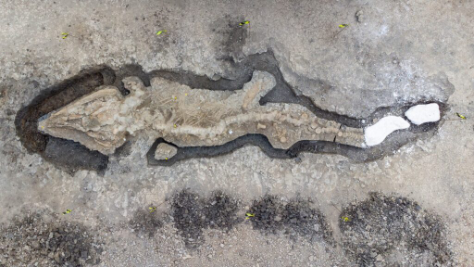
The massive fossil is the largest and most complete of its kind to be found in the United Kingdom.
Dean Lomax, the excavation’s leader and a visiting scientist at the University of Manchester, described the find as “a truly unprecedented discovery and one of the greatest finds in British palaeontological history” in a statement.
The latest discovery is the largest of several such ichthyosaurs that have been discovered in the United Kingdom.
The order Ichthyosaurs, which refers to a huge group of ancient marine reptiles, originated approximately 250 million years ago during the Triassic period and vanished from the fossil record approximately 90 million years ago during the Late Cretaceous period. They resembled dolphins of today and had long snouts.
This is the first record of Temnodontosaurus trigonodon, a huge species of ichthyosaur, that has been found in the United Kingdom. The ichthyosaur was discovered in January 2021 on the Rutland Water Nature Reserve in the East Midlands by Joe Davis, a conservation team leader for the Leicestershire and Rutland Wildlife Trust, according to the release.
As Davis and Paul Trevor, who also works on the trust’s reserve, were strolling across a drained lagoon, Davis noticed what appeared to be clay pipes poking out of the muck. He told Trevor that they resembled vertebrae.
Having previously discovered whale and dolphin skeletons while working on the Hebrides, a group of islands off the northwest coast of Scotland, Davis was no stranger to the bones of marine animals.
According to Davis, “Paul [Trevor] found something further along that could have been a jawbone. We followed what unquestionably looked like a spine.” “It was hard for us to believe.”
The fossil was discovered in August and September of 2021 by archaeologists.
The discovery will be highlighted in the British television series “Digging for Britain,” which premieres on BBC Two on Tuesday, January 11, in the United Kingdom.
The statement said that scientific articles describing the find will be published in the future, though no specific date was mentioned. Archaeologists are currently examining and conserving the ichthyosaur fossil.
